- Home
- Warhammer 40K
Vaults of Terra- The Hollow Mountain - Chris Wraight
Vaults of Terra- The Hollow Mountain - Chris Wraight Read online
Backlist
More tales of the Inquisition from Black Library
• The Vaults of Terra by Chris Wraight •
THE CARRION THRONE
THE HOLLOW MOUNTAIN
• The Horusian Wars by John French •
RESURRECTION
INCARNATION
• Agent of the Throne •
An audio drama series by John French
BLOOD AND LIES
TRUTH AND DREAMS
ASHES AND OATHS
• The Eisenhorn series by Dan Abnett •
XENOS
MALLEUS
HERETICUS
THE MAGOS
• The Ravenor trilogy by Dan Abnett •
RAVENOR
RAVENOR RETURNED
RAVENOR ROGUE
PARIAH
Dan Abnett
• The Inquisition War by Ian Watson •
DRACO
HARLEQUIN
CHAOS CHILD
ATLAS INFERNAL
Rob Sanders
Contents
Cover
Backlist
Title Page
Warhammer 40,000
Chapter One
Chapter Two
Chapter Three
Chapter Four
Chapter Five
Chapter Six
Chapter Seven
Chapter Eight
Chapter Nine
Chapter Ten
Chapter Eleven
Chapter Twelve
Chapter Thirteen
Chapter Fourteen
Chapter Fifteen
Chapter Sixteen
Chapter Seventeen
Chapter Eighteen
Chapter Nineteen
Chapter Twenty
Chapter Twenty-one
Chapter Twenty-two
Chapter Twenty-three
Chapter Twenty-four
Chapter Twenty-five
About the Author
An Extract from ‘The Horusian Wars: Incarnation’
A Black Library Publication
eBook license
It is the 41st millennium. For more than a hundred centuries the Emperor has sat immobile on the Golden Throne of Earth. He is the Master of Mankind by the will of the gods, and master of a million worlds by the might of His inexhaustible armies. He is a rotting carcass writhing invisibly with power from the Dark Age of Technology. He is the Carrion Lord of the Imperium for whom a thousand souls are sacrificed every day, so that He may never truly die.
Yet even in His deathless state, the Emperor continues His eternal vigilance. Mighty battlefleets cross the daemon-infested miasma of the warp, the only route between distant stars, their way lit by the Astronomican, the psychic manifestation of the Emperor’s will. Vast armies give battle in His name on uncounted worlds. Greatest amongst His soldiers are the Adeptus Astartes, the Space Marines, bio-engineered super-warriors. Their comrades in arms are legion: the Astra Militarum and countless planetary defence forces, the ever-vigilant Inquisition and the tech-priests of the Adeptus Mechanicus to name only a few. But for all their multitudes, they are barely enough to hold off the ever-present threat from aliens, heretics, mutants – and worse.
To be a man in such times is to be one amongst untold billions. It is to live in the cruellest and most bloody regime imaginable. These are the tales of those times. Forget the power of technology and science, for so much has been forgotten, never to be re-learned. Forget the promise of progress and understanding, for in the grim dark future there is only war. There is no peace amongst the stars, only an eternity of carnage and slaughter, and the laughter of thirsting gods.
Chapter One
Niir Khazad was alive.
It had been borderline, for a while. Erunion, Courvain’s chirurgeon-philosophical, had worked patient hours over her, adjusting the vials and the sutures, snagging and twisting the flesh, until she was finally stabilised and her heart was beating and her lungs were pulling in air. When she awoke at last, it was his skinny face that she saw first, peering over half-moon spectacles as if scrutinising a disappointing lab specimen.
‘You’re tough,’ he admitted.
She knew that. Being born and raised on a death world had given her no alternative. During her long career, she’d suffered frequent and significant physical trauma and had always pulled through. On the mag-anchor platforms in low orbit over Dramde XI she’d taken a bolt-round through her shoulder that had pulled a fist-sized chunk of flesh with it. That should have killed her, as should the poison-laced spike in her stomach under the hive-slums of Hydra Demetrius. Back then, though, she had been able to draw on the services of Inquisitor Hovash Phaelias. Her old master had been a thorough man, with a well-supplied armoury and well-maintained apothecarion, and so her medical care, when needed, had been exemplary. Now, through a fog of pain suppressors, she barely knew where she was, let alone how reliable her treatment had been. Looking at Erunion, with his ghost-pale skin and flickering gaze, it was hard to be confident.
‘Yes,’ was all she croaked, proudly.
She gained strength after that. The chirurgeon shuffled away, coming back every few hours with more tinctures and needles. Servitors clunked and drooled around her cot, attending to the antiquated machines with their dumb, clumsy movements.
Her sense of self, of place, of memory, began to return. She remembered the long hunt, when it seemed like the world itself had turned against them all and her master’s retinue was picked off, one by one. During that time she had never tried to persuade him to leave, to flee off-world from a Terra that had become their enemy. An inquisitor did not flee, not when there was quarry to hunt. Right until the end, she had assumed that he would discover who their hidden enemies were and then find a way to counter them, but in that she had miscalculated. Phaelias was dead now, as were all the others. Only she remained, a fugitive plucked from the shadows of the great hive-spires and absorbed into another coterie of killers and misfits. Even then, death had still come for her in the deep catacombs under the Palace itself, where xenos and myth-pulled gods had fought amid the swirling shadows.
But she had cheated it again, one more time. Now she breathed, painfully. She blinked, painfully. She swallowed, and felt the rawness of her throat where the tubes had been. By the time she came fully back to her senses, the lumens in the chamber were dialled low. In the hazy murk, it took her some time to realise she was not alone.
‘Welcome back, assassin,’ said Erasmus Crowl.
She had never spoken to him before. She had only ever heard the name ‘Crowl’ when Spinoza had mentioned it, and such references had been fleeting and in haste. By the time the two of them had ended up in the same chamber at last, the las-bolts were already flying and the greatest of Rassilo’s hunters was coming for her with murder in their eyes.
Still, it was hard to mistake him. He wore black robes trimmed with silver. His hair was slicked back to his skull, pulled away from a gaunt face of scars and sickness. He sat calmly, hands on his lap, still as the shadows around him. Only his voice, which had a soft, dry surface timbre, gave away a little more humanity.
She tried to lift her head from the pallet, and failed. ‘Inquisitor,’ she croaked.
Crowl got up, tipped away the metal can of water by her cot and replaced it with a fresh one. She took a cautious sip.
‘I wished to give you longer to recover,’ Crowl said. ‘They’re serious wounds. Spinoza thought you might die fr
om them.’
Spinoza. Luce Spinoza. The woman – Crowl’s interrogator – who had tracked her down and in all likelihood saved her life. She was cut from exceptional cloth, that one – rougher, harder, more ebulliently physical. Khazad and she were similar in many ways – warriors schooled in the Imperium’s imaginative arts of combat – but the man before her was a breed apart. Frailer in body, it seemed, but with an evident mental strength that even now, even here, was capable of chilling with a word.
‘Does she live?’ Khazad asked. It was hard to remember precisely how things had ended, down there in the deeps under those immense walls.
‘She lives, Emperor be praised. I think it would be very hard to end her, and I am grateful for that.’
Khazad swallowed again. It was slowly getting easier. ‘Then, can I–’
‘Peace,’ said Crowl, quietly. ‘You are not under edict of interrogation. Questions will have to come when you are stronger. For the time being, I wish you to know you are safe.’
Khazad smiled weakly. ‘Nowhere safe.’
‘Ha. Maybe not. But there are degrees of danger. Do you know where you are?’
Khazad nodded.
‘Most who come here never leave,’ Crowl said. ‘You, of course, may leave whenever you wish. I know a little of the Shoba doctrine. You will need to locate those who wronged you.’
‘Yes,’ she said vehemently. ‘I know names. If any still live–’
‘Indeed, and I approve of the sentiment.’ He leaned forward, into the pool of murky light, and Khazad saw the deep rings of black under his eyes. ‘You must take whatever path seems right to you,’ he said. ‘Either alone, or, if you choose, with us. Spinoza might have told you I habitually worked alone. That was partially true, for a long time, but things are becoming perilous here. An assassin of the Shoba school would be of use to me. It wouldn’t be the safest option, given how things are, but think on it, when you’re recovered.’
Khazad looked at him directly. ‘No time needed. I stay here.’
Crowl raised an eyebrow. ‘Really? You don’t wish to consider it?’
‘Spinoza trust me. I trust her. Have no other master – you will do.’
Crowl chuckled. ‘I see.’ He got up, and Khazad saw for the first time how lean he was out of the armour she’d witnessed him wearing before. In his long robes he looked like a coiled whip, frayed and flaking from overzealous use. ‘Get better then,’ he said, seriously. ‘Get stronger.’
Khazad began to feel her awareness slipping away again. Erunion must have piped something down the tubes that still ran into her arteries, something that would knock her out and accelerate the healing that still needed to be done.
‘Will be ready,’ she said fiercely, keeping her eyes open as long as she could.
‘Good,’ said Crowl. ‘They’ll come for you again, now. They’ll come for me, too.’
‘Yes.’
‘Just so you know. It isn’t over.’
Sleep rose up to smother her again, hot and cloying.
‘Never is,’ she murmured, thinking back over all those injuries. ‘Always start again.’
Maldo Revus, too, was recovering.
His body, too, was a thing of consummate toughness, honed and shriven over decades until every muscle was like boiled leather, held together by its scars and bearing the marks of its armour pieces. He had limped out of the catacombs with Spinoza, his carapace plate riddled with dents and his helm visor blurred with his own blood. That was the way such things usually ended, of course, so he had no complaints about it.
Perhaps, though, as he aged, the recovery times were lengthening a little. It had been eight years now, with Crowl. Before that he had served as a sergeant with another Inquisitorial detachment, and before that he had been a private soldier in a storm trooper division on permanent void duty. His memories beyond that were blurred, perhaps due to the strain of near-constant combat, perhaps due to the after-effects of the mind-wipes he had undergone multiple times during preliminary training. There was no true beginning for him, no commencement, just a growing set of impressions, steadily becoming firmer, solidifying into his current state as Crowl’s loyal killer.
At times, he would dream of another time and another world – empty skies of pale green, a dusty plain stretching away towards gauzy horizons, a child running in terror from the iron ships hanging in the grit-blown air. Even now, after a routine action, while recuperating in Courvain’s medical bays, he might remember the nights he had endured in the schola, stinging from the welts left by the instructors’ electro-whips, his lips bloody from constant recitation of battle-doctrine. He could revisit himself as an adolescent sometimes, crying angrily into the thin sheets of his cot, fists balled against the bolsters, exhausted, broken. All that psycho-training had left its mark, bludgeoning out the weaker elements, leaving only what was necessary for his vocation. Like so many others in the service of the Throne, he had been forged, hard-tempered, then re-made.
Courvain, for one of Revus’ experience, might have been considered a less than optimal posting. Another man in his position might have agitated hard for promotion, for transfer to a personal detachment in a more prestigious location, or even command of an active-duty regiment in some branch of the mainstream Militarum. Revus, though, knew what Crowl offered. Some inquisitors were sadists, treating their troops as expendable resources. Others were flamboyant mavericks, swaggering around the Imperium’s possessions like temporal lords and holding sway over fiefs in the name of none but themselves. Crowl was simpler to understand. He cared little for the outward ostentation of his office, but maintained an orderly, active programme of investigation. He had high expectations of those in his service, but was solicitous over their wellbeing. That engendered loyalty in excess of that guaranteed by standard indoctrination alone. For those who served long enough, it inculcated something close to devotion.
And yet, it was still possible to have one’s faith shaken; to be exposed, even briefly, to a wider world. For a very short time, down in those lightless pits, Revus had fought alongside Custodians. They had barely noticed him, in all likelihood, and his own contribution to the encounter under the walls had been little better than nominal, and yet, still, he had served alongside them. A man might live for a hundred years and never see such a sight. He might tell stories of it with every detail perfectly represented, and none would believe him.
Now, in the shadows of the citadel’s interior, Revus stood on the edge of the training square, his linen jerkin soaked with sweat. He tried to recall how they had moved, how they had handled those crackling staves. Perhaps there was something to learn from it, however imperfectly or clumsily. There was always room for improvement, to become a better servant of the Throne, and it was hard to imagine more exalted role models.
But in truth, there was no emulating such paragons, not even by degree. They were as far above him as he was above the wretched and disease-blighted masses of the underhives. Already the experience had begun to seem like a dream, a too-vivid vision provoked by fever. Back in Courvain, all was dark again, all was stained and old. They had been like shards of gold in an imagined sunrise, fleeting, seen from a distance, a reminder of another possible world of myth and forgetfulness.
He pushed himself from the wall, flexing his aching arms. The baton was greasy in his grip. In the centre of the training square was a padded column two metres high, a static opponent of limited use for honing his skills. It would make him stronger though.
The overhead lumens flickered as he padded on to the mat, rehearsing the litanies of manual combat, the same ones he had been taught in the schola and had used ever since. The sodium tubes above him shook as he thudded the baton home, swinging heavily, panting and throwing sweat from his forehead. As he worked, as he pummelled and struck, he had the golden giants in his mind’s eye the whole time, those titans of combat whose movements had been so fast as t
o be nearly impossible to follow.
There was so much to do still. So far to go before he reached the limit of his potential and the absolute satisfaction of what the Throne could demand. Once they had been seen, they could never be forgotten, and could only remain there, visions, goading him towards greater accomplishment.
There would never be fighting like it again. If he had never lived to see another day, it would still have all been worth it, just for that.
‘Again, now,’ he murmured to himself, getting ready for another bout. ‘Faster this time. More accurate.’
The lumens pulsed, as if in readiness. Sweat ran in thin trails down his flushed skin.
He hefted the baton, and started again.
Now Terra was her home.
Spinoza’s time on the Throneworld had been so short. She had seen many planets in her time and each had left their mark, though none had claimed her so completely as this one. She had ingested its poisons and breathed its soot-heavy atmosphere. She had observed the blush fade from her skin, to be replaced by the grey pallor that all wore here. She had already been swallowed up, enveloped and weighted down, until there was nothing left but this place, this endless city, this press of thousands upon thousands of souls, all of them clamouring for something, anything.
Now she stared at herself in her small mirror above her personal hygiene station, lit on all sides by unforgiving lumen strips. She saw the harder edge to her jaw, the deeper lines around her eyes. Her hair, which had always been a pale blonde, was now bleached almost entirely white. Terra’s mark had been made, and the process could only continue.
She had a choice now. She could either do what Rassilo had done and indulge in augmetics and rejuvenat to hide the damage, or adopt her master’s policy of letting the world do its worst. The latter was the more honest course and appealed to her innate sense of conventional piety, but the temptation to fight against the grime was still strong. There were things she could do, techniques she could adopt, all of which required coin, which she had enough of, and time, which she didn’t. It was most likely, then, that she would let it slide and gradually become one with this place, just another grey-skinned, dark-eyed cadaver stalking the labyrinths.

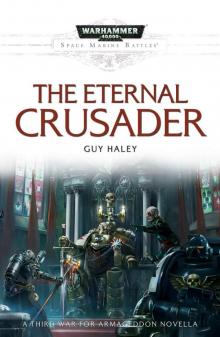 The Eternal Crusader - Guy Haley
The Eternal Crusader - Guy Haley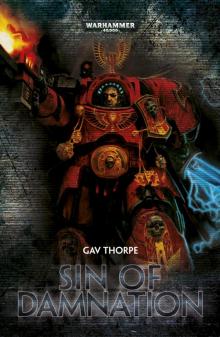 Sin of Damnation - Gav Thorpe
Sin of Damnation - Gav Thorpe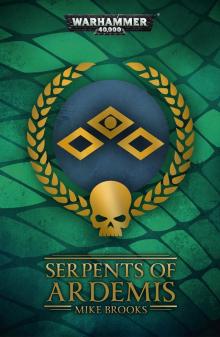 Serpents of Ardemis - Mike Brooks
Serpents of Ardemis - Mike Brooks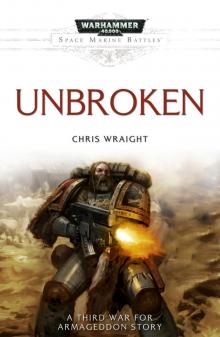 Unbroken - Chris Wraight
Unbroken - Chris Wraight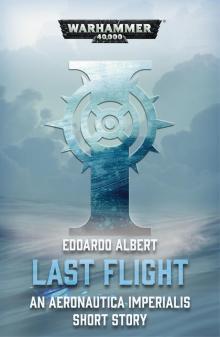 Last Flight - Edoardo Albert
Last Flight - Edoardo Albert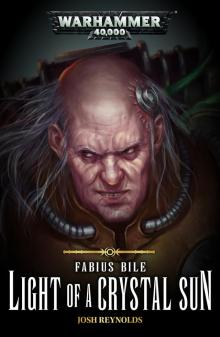 Light of a Crystal Sun - Josh Reynolds
Light of a Crystal Sun - Josh Reynolds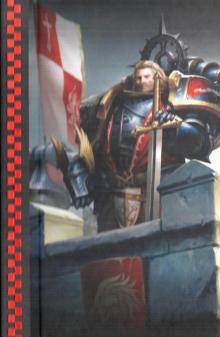 Lion El'Jonson- Lord of the First - David Guymer
Lion El'Jonson- Lord of the First - David Guymer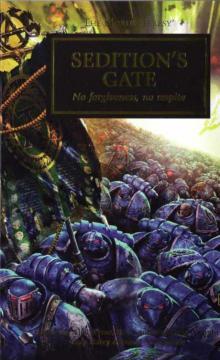 Sedition's Gate - Nick Kyme & Chris Wraight
Sedition's Gate - Nick Kyme & Chris Wraight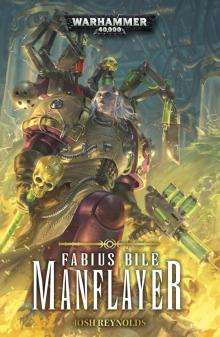 Manflayer - Josh Reynolds
Manflayer - Josh Reynolds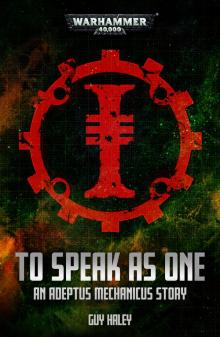 To Speak as One - Guy Haley
To Speak as One - Guy Haley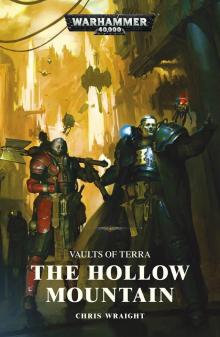 Vaults of Terra- The Hollow Mountain - Chris Wraight
Vaults of Terra- The Hollow Mountain - Chris Wraight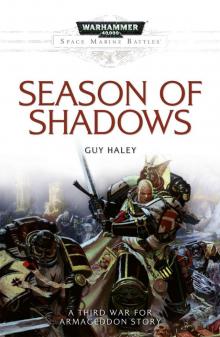 Season of Shadows - Guy Haley
Season of Shadows - Guy Haley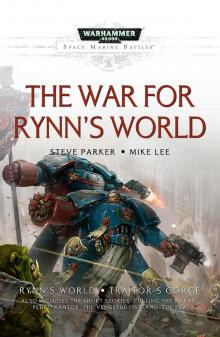 The War for Rynn's World - Steve Parker & Mike Lee
The War for Rynn's World - Steve Parker & Mike Lee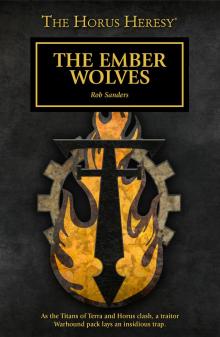 The Ember Wolves - Rob Sanders
The Ember Wolves - Rob Sanders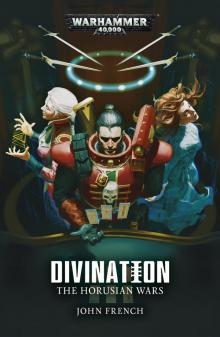 Divination - John French
Divination - John French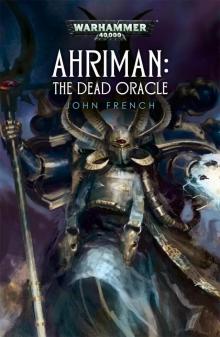 The Dead Oracle - John French
The Dead Oracle - John French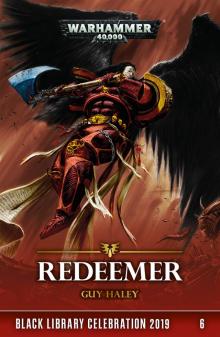 Redeemer - Guy Haley
Redeemer - Guy Haley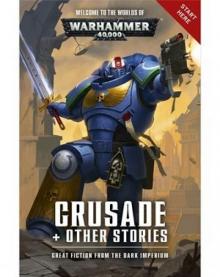 Crusade & Other Stories - Dan Abnett Et Al.
Crusade & Other Stories - Dan Abnett Et Al.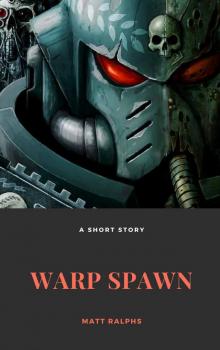 Warp Spawn - Matt Ralphs
Warp Spawn - Matt Ralphs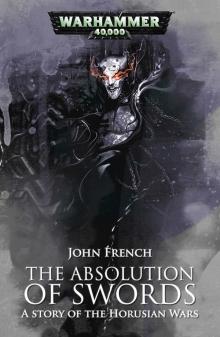 The Absolution of Swords - John French
The Absolution of Swords - John French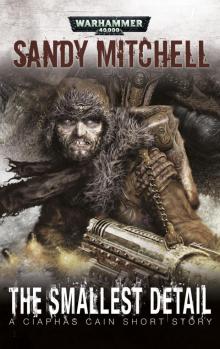 The Smallest Detail - Sandy Mitchell
The Smallest Detail - Sandy Mitchell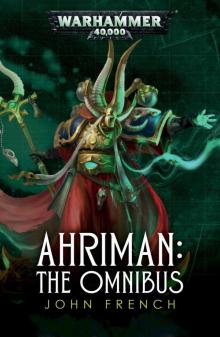 The Omnibus - John French
The Omnibus - John French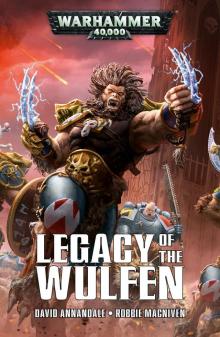 Legacy of the Wulfen - David Annandale & Robbie MacNiven
Legacy of the Wulfen - David Annandale & Robbie MacNiven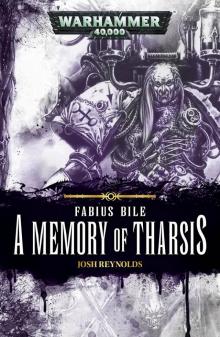 A Memory of Tharsis - Josh Reynolds
A Memory of Tharsis - Josh Reynolds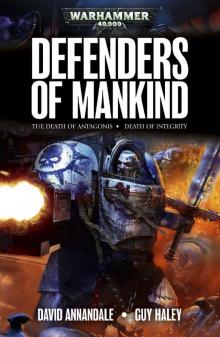 Defenders of Mankind - David Annandale & Guy Haley
Defenders of Mankind - David Annandale & Guy Haley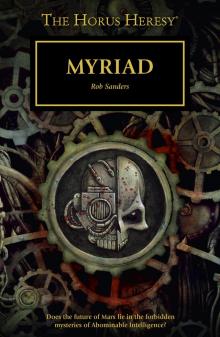 Myriad - Rob Sanders
Myriad - Rob Sanders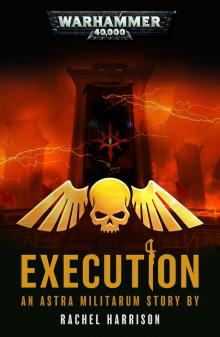 Execution - Rachel Harrison
Execution - Rachel Harrison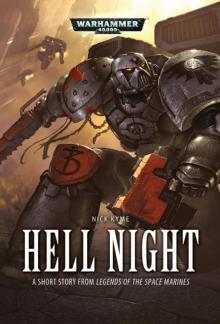 Hell Night - Nick Kyme
Hell Night - Nick Kyme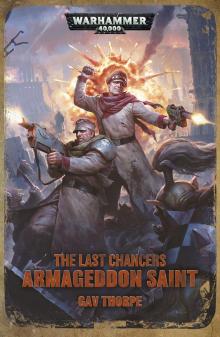 Armageddon Saint - Gav Thorpe
Armageddon Saint - Gav Thorpe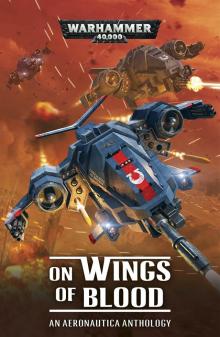 On Wings of Blood
On Wings of Blood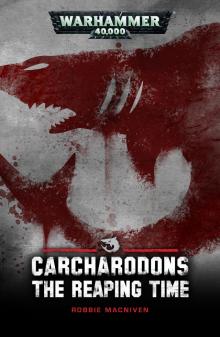 The Reaping Time - Robbie MacNiven
The Reaping Time - Robbie MacNiven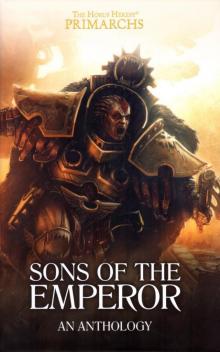 Sons of the Emperor
Sons of the Emperor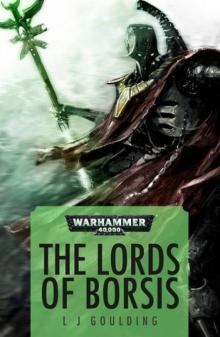 The Lords of Borsis - L J Goulding
The Lords of Borsis - L J Goulding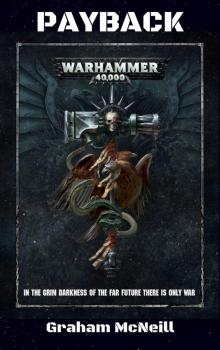 Payback - Graham McNeill
Payback - Graham McNeill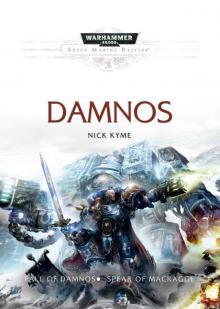 Damnos - Nick Kyme
Damnos - Nick Kyme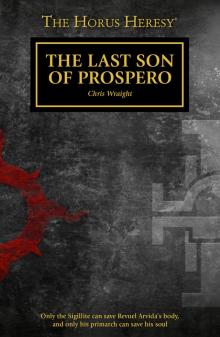 The Last Son of Prospero - Chris Wraight
The Last Son of Prospero - Chris Wraight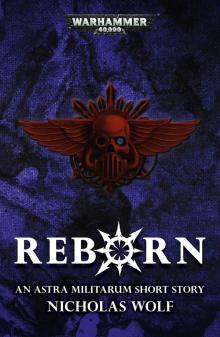 Reborn - Nicholas Wolf
Reborn - Nicholas Wolf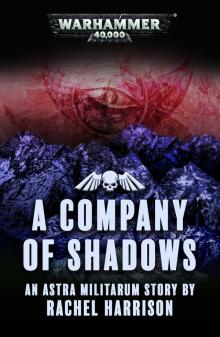 A Company of Shadows - Rachel Harrison
A Company of Shadows - Rachel Harrison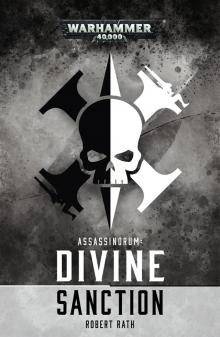 Assassinorum- Divine Sanction - Robert Rath
Assassinorum- Divine Sanction - Robert Rath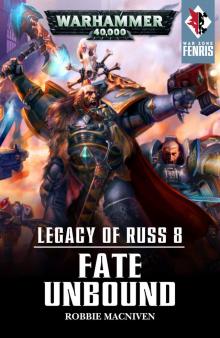 Fate Unbound - Robbie MacNiven
Fate Unbound - Robbie MacNiven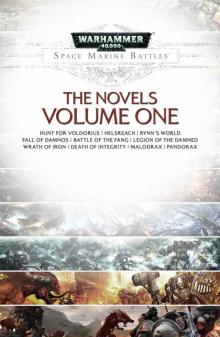 Space Marine Battles - the Novels Volume 1
Space Marine Battles - the Novels Volume 1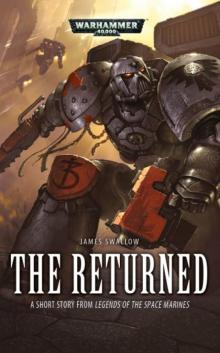 The Returned - James Swallow
The Returned - James Swallow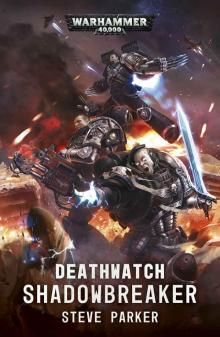 Shadowbreaker - Steve Parker
Shadowbreaker - Steve Parker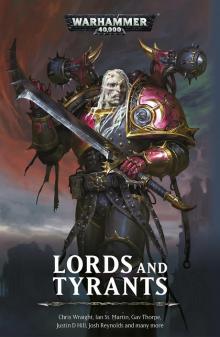 Lords and Tyrants
Lords and Tyrants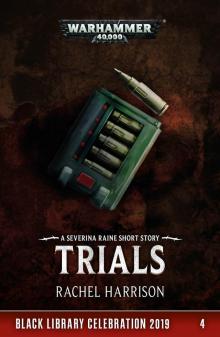 Trials - Rachel Harrison
Trials - Rachel Harrison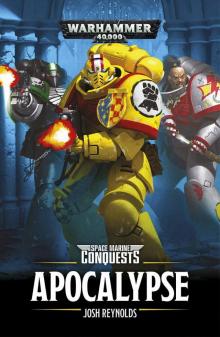 Apocalypse - Josh Reynolds
Apocalypse - Josh Reynolds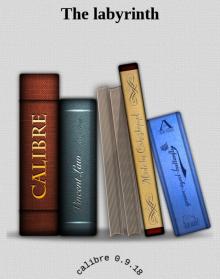 The labyrinth - Richard Ford
The labyrinth - Richard Ford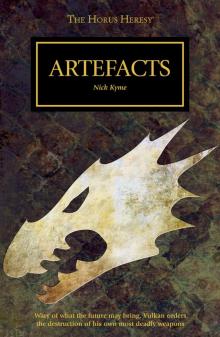 Artefacts - Nick Kyme
Artefacts - Nick Kyme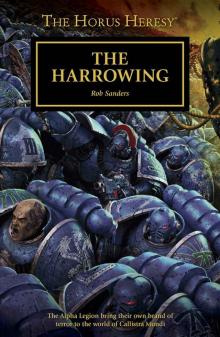 The Harrowing - Rob Sanders
The Harrowing - Rob Sanders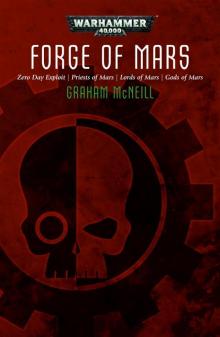 Forge of Mars - Graham McNeill
Forge of Mars - Graham McNeill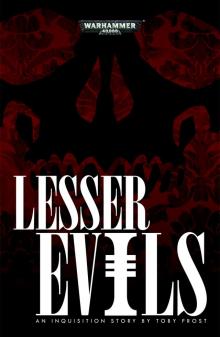 Lesser Evils - Toby Frost
Lesser Evils - Toby Frost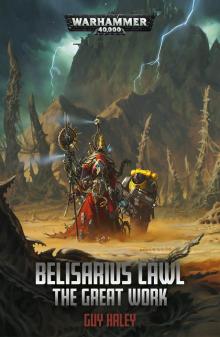 Belisarius Cawl- the Great Work - Guy Haley
Belisarius Cawl- the Great Work - Guy Haley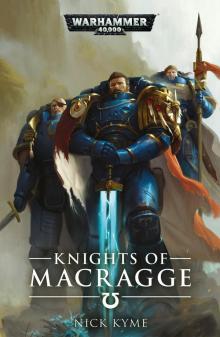 Knights of Macragge - Nick Kyme
Knights of Macragge - Nick Kyme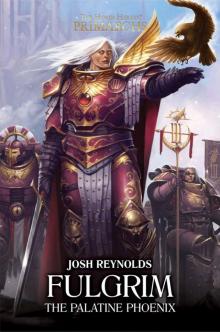 Fulgrim- The Palatine Phoenix - Josh Reynolds
Fulgrim- The Palatine Phoenix - Josh Reynolds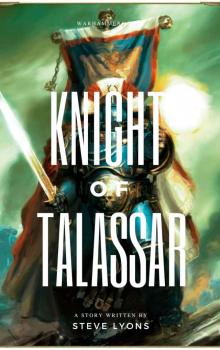 Knight of Talassar - Steve Lyons
Knight of Talassar - Steve Lyons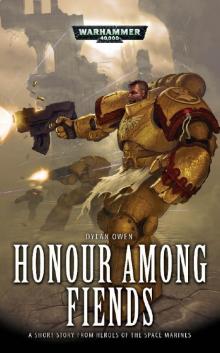 Honour Among Fiends - Dylan Owen
Honour Among Fiends - Dylan Owen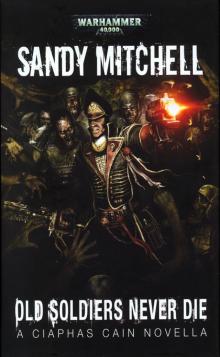 Old Soldiers Never Die - Sandy Mitchell
Old Soldiers Never Die - Sandy Mitchell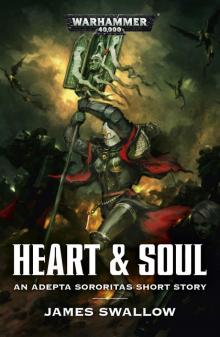 Heart & Soul - James Swallow
Heart & Soul - James Swallow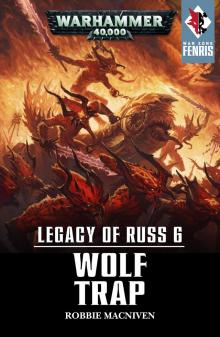 Wolf Trap - Robbie MacNiven
Wolf Trap - Robbie MacNiven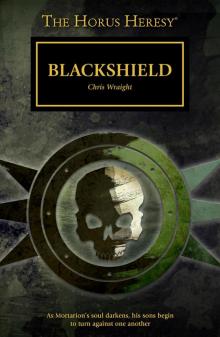 Blackshield - Chris Wraight
Blackshield - Chris Wraight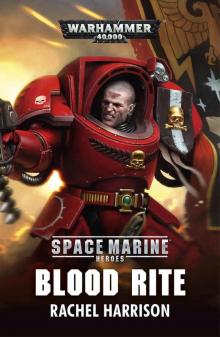 Blood Rite - Rachel Harrison
Blood Rite - Rachel Harrison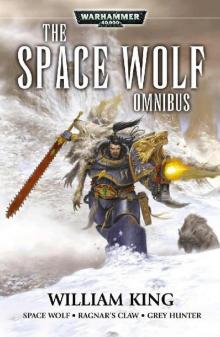 The Space Wolf Omnibus - William King
The Space Wolf Omnibus - William King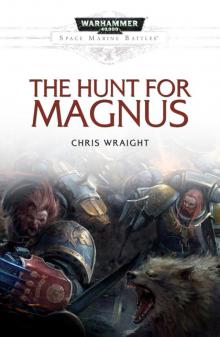 The Hunt for Magnus - Chris Wraight
The Hunt for Magnus - Chris Wraight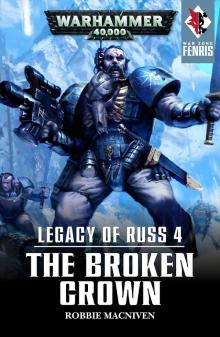 The Broken Crown - Robbie MacNiven
The Broken Crown - Robbie MacNiven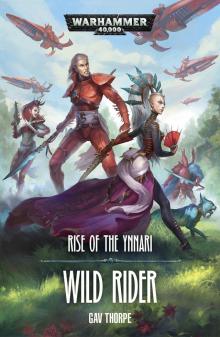 Wild Rider - Gav Thorpe
Wild Rider - Gav Thorpe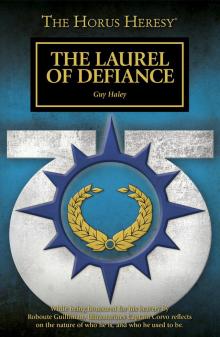 The Laurel of Defiance - Guy Haley
The Laurel of Defiance - Guy Haley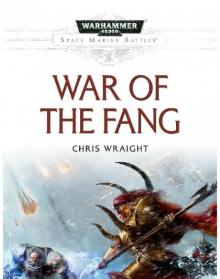 War of the Fang - Chris Wraight
War of the Fang - Chris Wraight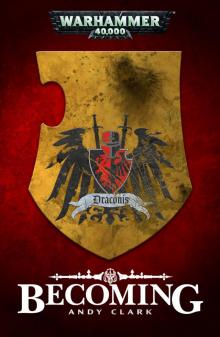 Becoming - Andy Clark
Becoming - Andy Clark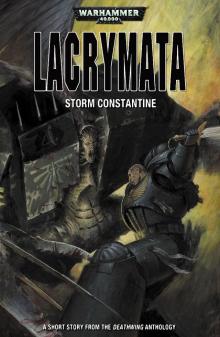 Lacrymata - Storm Constantine
Lacrymata - Storm Constantine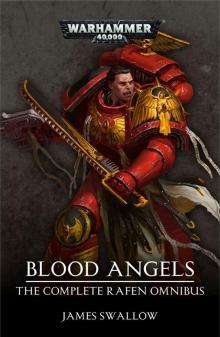 Blood Angels - The Complete Rafen Omnibus - James Swallow
Blood Angels - The Complete Rafen Omnibus - James Swallow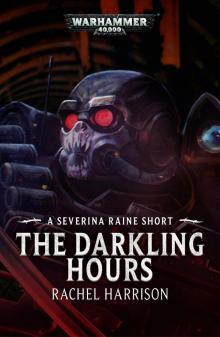 The Darkling Hours - Rachel Harrison
The Darkling Hours - Rachel Harrison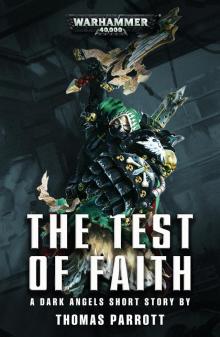 The Test of Faith - Thomas Parrott
The Test of Faith - Thomas Parrott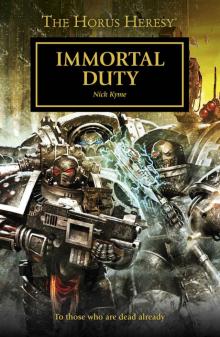 Immortal Duty - Nick Kyme
Immortal Duty - Nick Kyme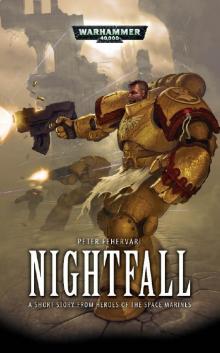 Nightfall - Peter Fehervari
Nightfall - Peter Fehervari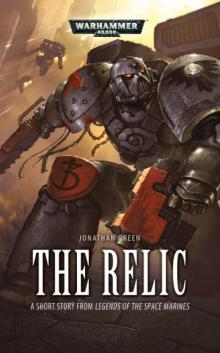 The Relic - Jonathan Green
The Relic - Jonathan Green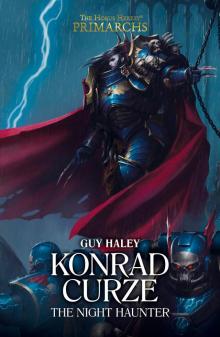 Konrad Curze the Night Haunter - Guy Haley
Konrad Curze the Night Haunter - Guy Haley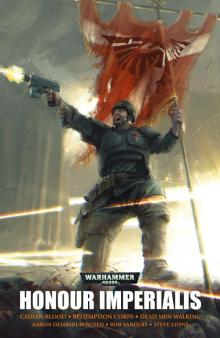 Honour Imperialis - Aaron Dembski-Bowden
Honour Imperialis - Aaron Dembski-Bowden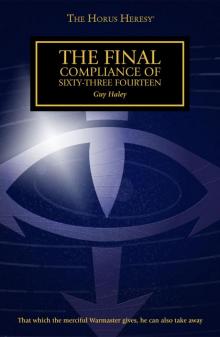 The Final Compliance of Sixty-Three Fourteen - Guy Haley
The Final Compliance of Sixty-Three Fourteen - Guy Haley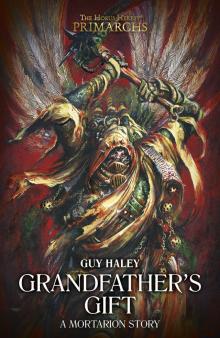 Grandfather’s Gift - Guy Haley
Grandfather’s Gift - Guy Haley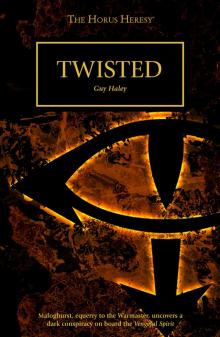 Twisted - Guy Haley
Twisted - Guy Haley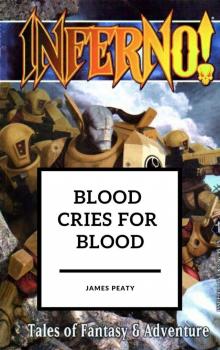 Blood Cries for Blood - James Peaty
Blood Cries for Blood - James Peaty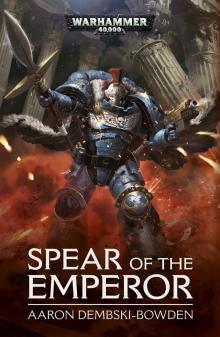 Spear of the Emperor - Aaron Dembski-Bowden
Spear of the Emperor - Aaron Dembski-Bowden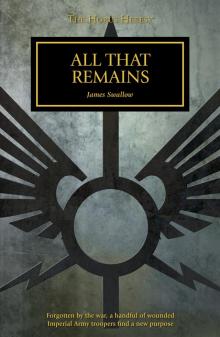 All That Remains - James Swallow
All That Remains - James Swallow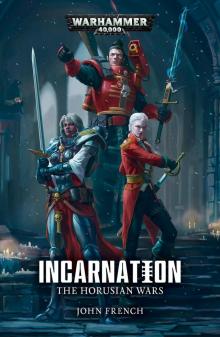 Incarnation - John French
Incarnation - John French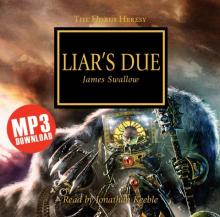 Liar's Due - Ben Swallow
Liar's Due - Ben Swallow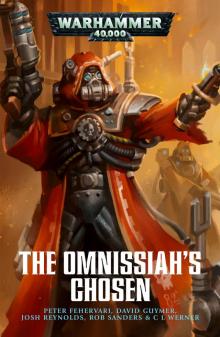 The Omnissiah's Chosen - Peter Fehervari
The Omnissiah's Chosen - Peter Fehervari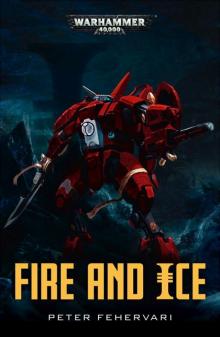 Fire and Ice - Peter Fehervari
Fire and Ice - Peter Fehervari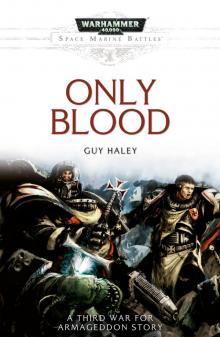 Only Blood - Guy Haley
Only Blood - Guy Haley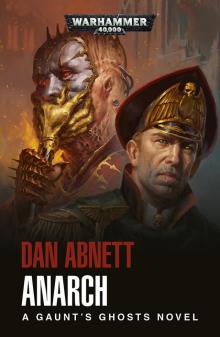 Anarch - Dan Abnett
Anarch - Dan Abnett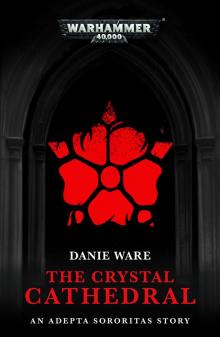 The Crystal Cathedral - Danie Ware
The Crystal Cathedral - Danie Ware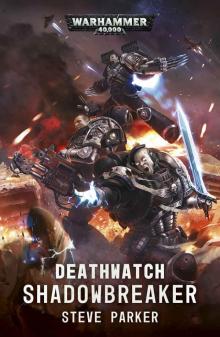 Shadowbreaker
Shadowbreaker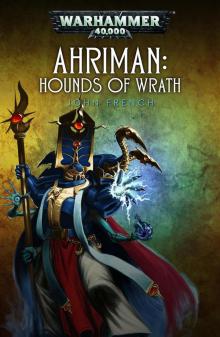 Hounds of Wrath - John French
Hounds of Wrath - John French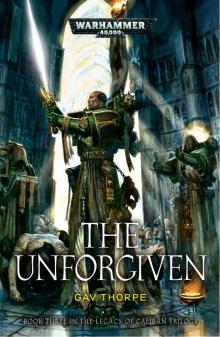 The Unforgiven - Gav Thorpe
The Unforgiven - Gav Thorpe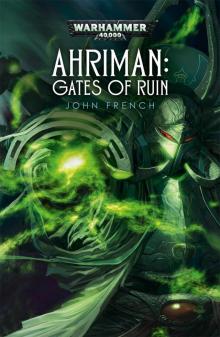 Gates of Ruin - John French
Gates of Ruin - John French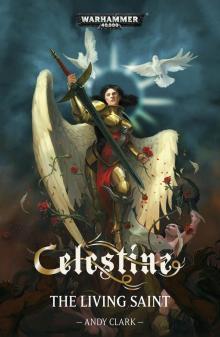 Celestine - Andy Clark
Celestine - Andy Clark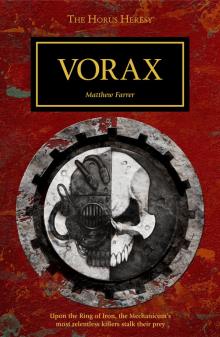 Vorax - Matthew Farrer
Vorax - Matthew Farrer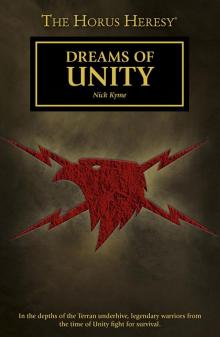 Dreams of Unity - Nick Kyme
Dreams of Unity - Nick Kyme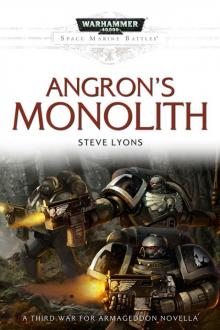 Angron's Monolith - Steve Lyons
Angron's Monolith - Steve Lyons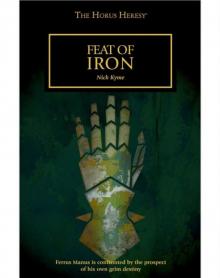 Feat of Iron - Nick Kyme
Feat of Iron - Nick Kyme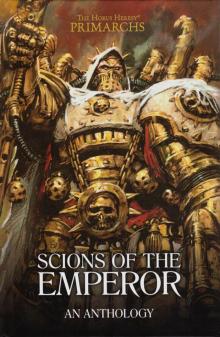 Scions of the Emperor
Scions of the Emperor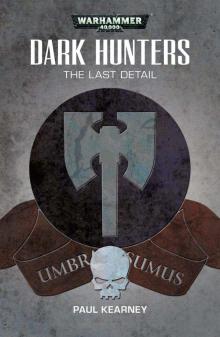 The Last Detail - Paul Kearney
The Last Detail - Paul Kearney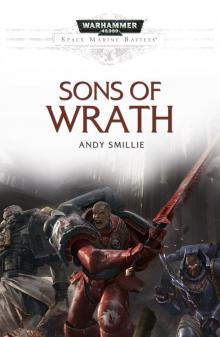 Sons of Wrath - Andy Smillie
Sons of Wrath - Andy Smillie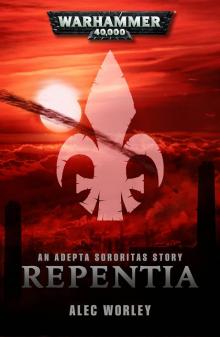 Repentia - Alec Worley
Repentia - Alec Worley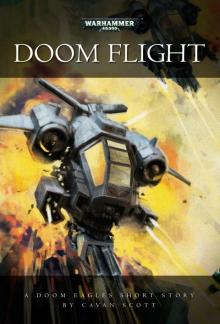 Doom Flight - Cavan Scott
Doom Flight - Cavan Scott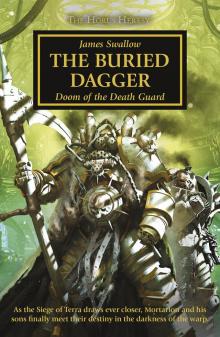 The Buried Dagger - James Swallow
The Buried Dagger - James Swallow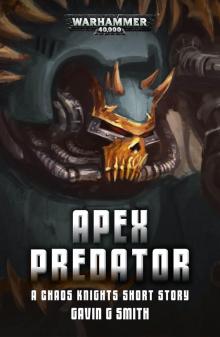 Apex Predator - Gavin G Smith
Apex Predator - Gavin G Smith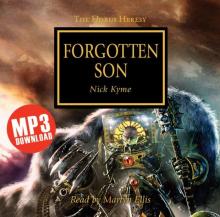 Forgotten Sons - Nick Kyme
Forgotten Sons - Nick Kyme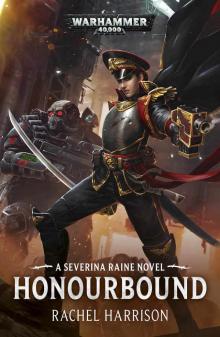 Honourbound - Rachel Harrison
Honourbound - Rachel Harrison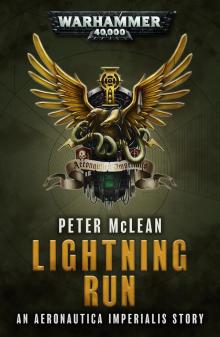 Lightning Run - Peter McLean
Lightning Run - Peter McLean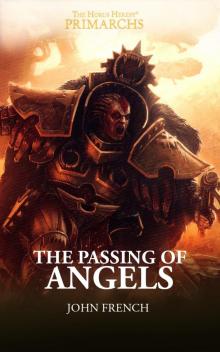 The Passing of Angels - John French
The Passing of Angels - John French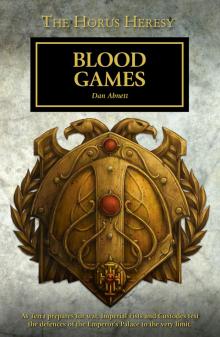 Blood Games - Dan Abnett
Blood Games - Dan Abnett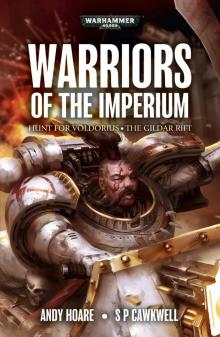 Warriors of the Imperium - Andy Hoare & S P Cawkwell
Warriors of the Imperium - Andy Hoare & S P Cawkwell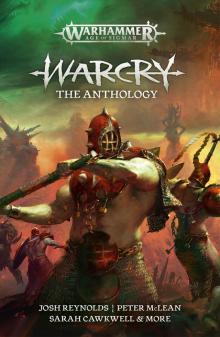 Warcry
Warcry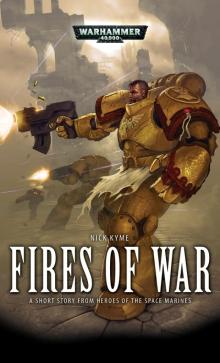 Fires of War - Nick Kyme
Fires of War - Nick Kyme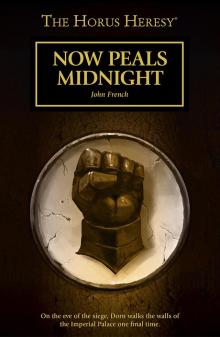 Now Peals Midnight - John French
Now Peals Midnight - John French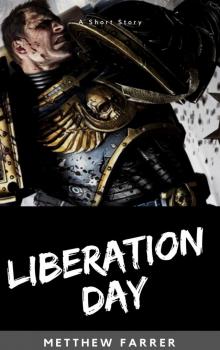 Liberation Day - Matthew Farrer
Liberation Day - Matthew Farrer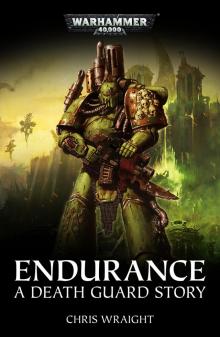 Endurance - Chris Wraight
Endurance - Chris Wraight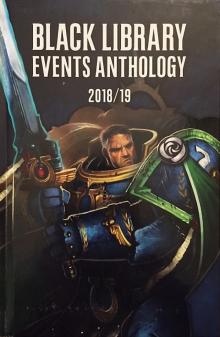 Black Library Events Anthology 2018-19
Black Library Events Anthology 2018-19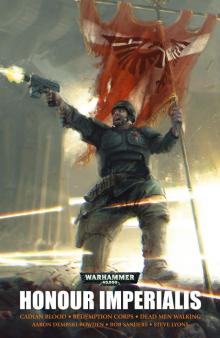 Honour Imperialis - Braden Campbell & Aaron Dembski-Bowden & Chris Dows & Steve Lyons & Rob Sanders
Honour Imperialis - Braden Campbell & Aaron Dembski-Bowden & Chris Dows & Steve Lyons & Rob Sanders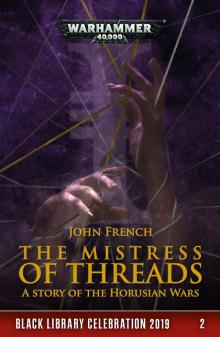 The Mistress of Threads - John French
The Mistress of Threads - John French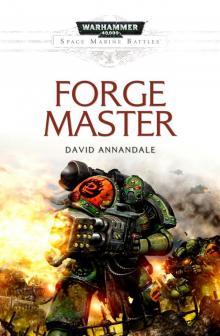 Forge Master - David Annandale
Forge Master - David Annandale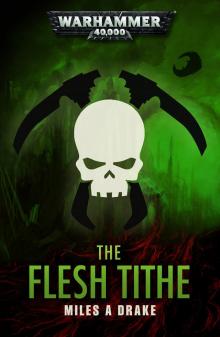 The Flesh Tithe - Miles A Drake
The Flesh Tithe - Miles A Drake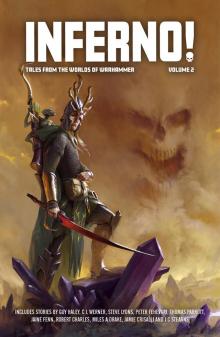 Inferno Volume 2 - Guy Haley
Inferno Volume 2 - Guy Haley Mercy of the Dragon - Nick Kyme
Mercy of the Dragon - Nick Kyme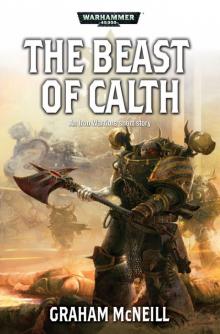 The Beast of Calth - Graham McNeill
The Beast of Calth - Graham McNeill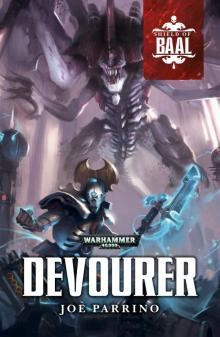 Devourer - Joe Parrino
Devourer - Joe Parrino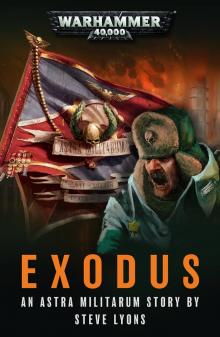 Exodus - Steve Lyons
Exodus - Steve Lyons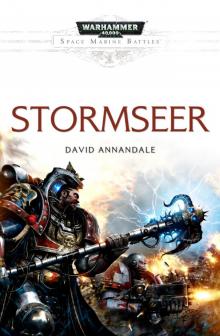 Stormseer - David Annandale
Stormseer - David Annandale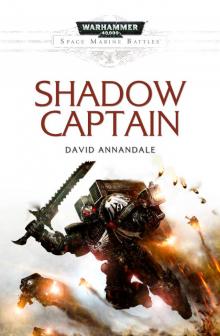 Shadow Captain - David Annandale
Shadow Captain - David Annandale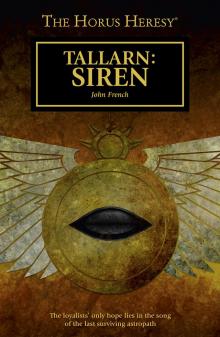 Tallarn- Siren - John French
Tallarn- Siren - John French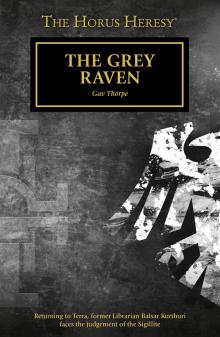 The Grey Raven - Gav Thorpe
The Grey Raven - Gav Thorpe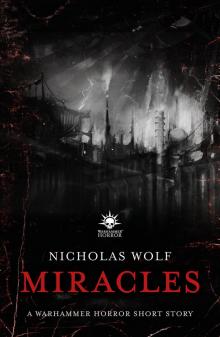 Miracles - Nicholas Wolf
Miracles - Nicholas Wolf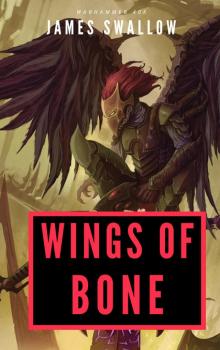 Wings of Bone - James Swallow
Wings of Bone - James Swallow